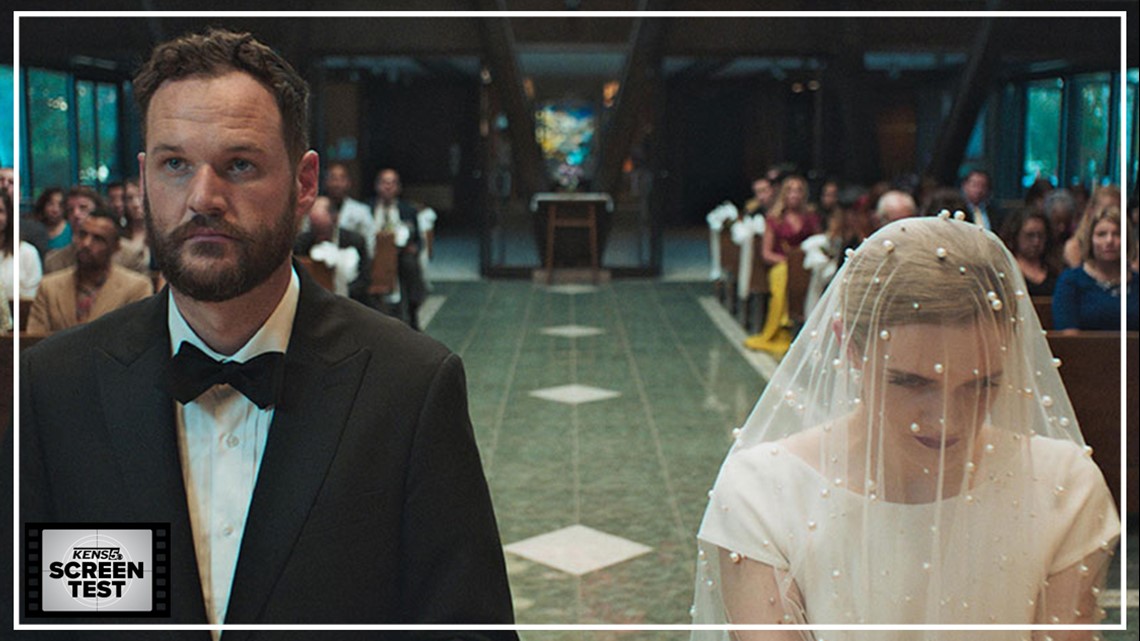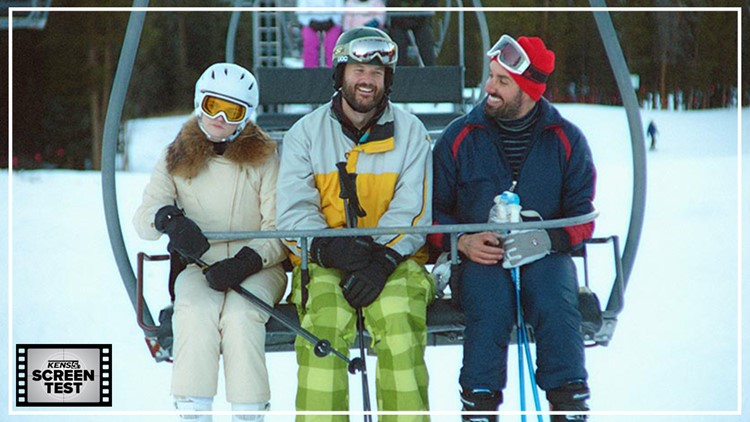[[Note: When "The Climb" releases in the U.S., it will largely be at indoor movie theaters during the ongoing coronavirus pandemic. While the purpose of this review goes deeper than binary recommendation to discuss the film's merits as an artistic work in context of its time, we encourage our readers to continue exercising the latest safety guidelines from health authorities and consider them if and when you may decide to visit the cinema to watch this movie.]]
It may not be a coincidence that Mike – one half of the bromance desperate to be rekindled in the myopic but bitingly funny new drama “The Climb” – reflects the soul-weary aura that Casey Affleck tends to bring to the movies, especially when he grows a beard and pivots to downtrodden alcoholism (i.e., very early). But if that’s the case, it’s also appropriately ironic that the comparison is easier to observe when we see Mike on the edges of the frame, walking on a frozen lake or pouring his tenth New Year’s Eve shot—when he most resembles a ragged ghost of troubled-spirit archetypes whose own story the movie makes little effort to shape. A film of bravura aesthetic style and chronological leap-frogging, “The Climb” is a cinematic gamble whose shake of the dice-filled fist would be easier to appreciate on its own terms if only we could decipher the wager that its writer-director-star, Michael Angelo Covino, was trying to make.
“The Climb” opens with a great sequence: Two bicyclists are making their way up a mountainside highway, one of them huffing and puffing while the other pedals with habitual ease. Their names are Mike (Covino) and Kyle (played by Kyle Marvin), and we can tell they go way back; in between taking gulps of air, Kyle suggests the two buds should make this a routine. It would be good for him, he says, and the implication is it would be a good way of lubricating their own bond, too. As the more-in-shape Mike pedals ahead, waits for Kyle to catch up and yells hilariously at the driver honking behind them to go around, we come to notice the sequence is unfolding without cuts—the camera is constantly gliding just ahead of or right alongside our protagonists, magnifying the action and chaffed gaps in conversation. Eventually the punchline arrives as Mike confesses something that puts the friendship’s future into immediate question, and as a steam-headed Kyle furiously pedals to close the distance between them, sounds of swinging punches are heard off-screen before their source comes into view: Mike and the driver from two minutes earlier are going at it, while Kyle pensively watches on.
The opening is a screwball delight, propelled by a cynicism that meshes deliciously with the situational irony and absence of expositional backstory. If it feels like those eight minutes would make for a successful self-contained skit in their own right, you’re on target; it’s an uncanny recreation of Covino’s Sundance-anointed 2018 short of the same name, down to Mike and Kyle’s dialogue and the color of their helmets. Now, however, 2020’s “The Climb” – co-written by Covino and Marvin, and finally set for U.S. release after bowing at Cannes last year – positions the bike ride as prologue to an elongated saga of splintered connection, and as a template for the half-dozen or so chapters to come, each punctuated by an intermission representing the passage of weeks, months and, finally, years.
Each of these vignettes unfolds in real time, in different physical and mental spaces. Each finds Kyle and Mike treading bumpy ground with each other and with life as others move through it, none more important than Kyle’s feisty new fiance, Marissa (Gayle Ranking). And each is attentive to the moves of cinematographer Zach Kuperstein, who maintains the opening’s one-take splendor while swooping up stairs into busy kitchens, out of packed wedding ceremonies and through prickly arguments. Coming off a decade that saw the legendary visual acrobats of Roger Deakins and Emmanuel Lubezki be beatified as much as they were criticized, it’s almost a worthwhile in-joke that “The Climb” goes to the effort of such logistics required of “oners” not to emphasize the horrors of World War I or Broadway disasters, but the relatively subdued malaise of suburban domesticity. It’s also indicative of a movie that is most interesting in its peripheries that Kuperstein’s sensibilities are at peak efficiency not when he’s in constant motion, but when he’s static; in these moments, an all-important sense of discomfort is harvested, and whatever shenanigans are revving up just outside the frame are easier to bust out laughing at.
But as the central narrative grows, so does our inability to find true north in the film’s merits. In expanding the 2018 short’s narrative to a tick under two hours, Covino and Marvin turn the exhilarating specificity of its setting and visual metaphor into an unconvincing canvas of clumsy middle-age passengers. Kyle, Mike and Marissa are too sterile as characters to overcome a lingering reductiveness, and the tone is too reliant on its set piece-structured silliness for sincerity to poke through. “The Climb” is striving for Lonergan by way of Apatow, but it stumbles in the process.


The problem is that Covino’s template is too distinguishable to allow the story’s tensions to flourish. “The Climb” is hugely effective with its absurdist touches and expertly executed observations of interpersonal causticity, but the murkiness of its intent makes it nearly impossible to be enveloped into a wide-eyed story about the evolution and dissolution of relationships. “It was funny when you were fat; now it’s just too serious,” Marissa says to Kyle at one point, summing up where the movie falls short. The way its visual elasticity attempts to identify a particular dead-endedness in its characters is an inspired commitment, but it’s never clear whether we’re meant to sympathize with his protagonists or merely chuckle at how airheaded they are. Another 2020 movie, Dan Sallitt’ “Fourteen,” an even more microscopic drama, is a much sharper and moving portrait of an enduring relationship that’s long rusted over.
The film’s final act may be its best, when “The Climb” most confidently embraces itself to be about the entrenched awkwardness of confrontation as Kyle and Mike begin coming to terms with the fact that following your impulses yields increasingly diminishing returns as life goes on. It’s the sharpest comment the movie provides. But it doesn’t make it any less frustrating when the camera fades to black at the most crucial emotional juncture in the narrative, leaving us to wonder what characters would say and act like when they’re at their most vulnerable. Covino and Marvin are doing little more than implying the inevitable, and hoping against hope that that translates into substance.
“The Climb” is rated R for language, sexual content, some nudity and brief drug use. It opens in select theaters Friday.
Starring: Michael Angelo Covino, Kyle Marvin, Gayle Rankin, Judith Godreche
Directed by Michael Angelo Covino
2020
OTHER SCREEN TEST REVIEWS
- ‘Let Him Go’ Review: A multi-toned neo-Western that veers between soulfulness and explosiveness
- ‘Kindred’ Review: A finely crafted, vaguely familiar thriller that would make Edgar Allen Poe proud
- ‘Come Play’ Review: Techno-boogeyman thriller offers routine scares, roughly drawn sentimentality
- ‘Holidate’ Review: Emma Roberts, Luke Bracey star in Netflix’s sardonic attempt at subverting Hallmark Channel sentimentality
- ‘On the Rocks’ Review: Sofia Coppola’s familial drama finds casual tenderness in fractured connections
- 'The Witches' Review: Robert Zemeckis's redundant update of Roald Dahl's fantasy belongs on the back of a cereal box
- ‘Time’ Review: One of 2020’s greatest documentaries is a vivid portrait of emotional endurance and mass incarceration’s specters
- ‘The Trial of the Chicago 7’ Review: A stellar cast boosts Aaron Sorkin’s simplified courtroom epic



